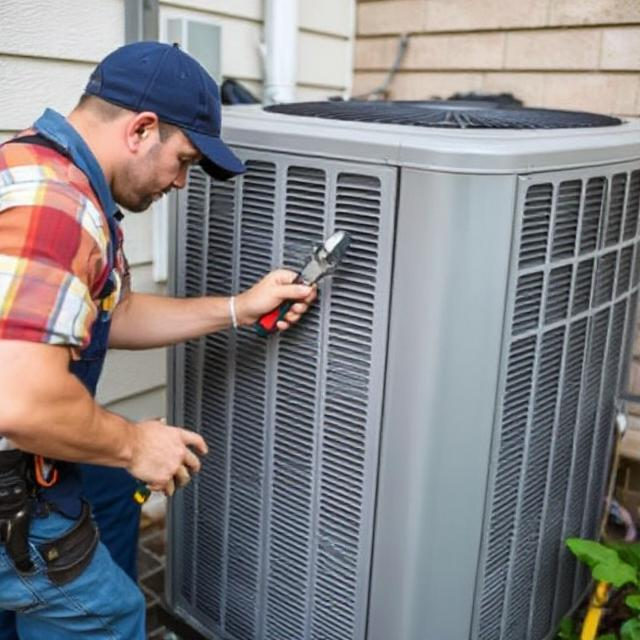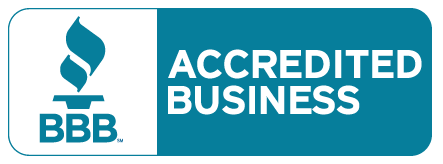One of the most common AC repair is refrigerant leaks. When refrigerant is low due to leaks, the system struggles to cool properly, resulting in longer cooling cycles, weak airflow, and warm air from vents. But there are many other reasons that can cause your AC to fail.
Air conditioners work hard to keep your home cool, but like any system, they can develop problems over time. Some issues are minor and easy to fix, while others require professional attention. Knowing the most common AC problems can help you identify issues early, prevent costly breakdowns, and keep your cooling system running optimally.
In this guide, we’ll explore seven of the most common air conditioner repairs, their causes, and when to call a professional for help. If you are in Middlefield, CT, and nearby areas, call our HVAC technician at 860-339-6001 for an inspection and estimate.
1. Refrigerant Leak and Recharge
The refrigerant absorbs heat from indoor air and releases it outside. The system struggles to maintain adequate cooling when an AC unit is low on refrigerant due to a leak. This can lead to longer cooling cycles, weak airflow, and warm air blowing from the vents.
Signs of a refrigerant leak include:
- Warm air from vents despite the system being turned on
- Ice buildup on refrigerant lines or evaporator coils
- Hissing or bubbling noises near the unit
- Increased energy bills due to inefficient cooling
Repairing a refrigerant leak requires specialized equipment and should not be considered a DIY task. Instead, contact a licensed HVAC technician near you to detect the leak, seal it properly, and recharge the refrigerant to the correct level.

2. Dirty or Clogged Air Filters
A clogged air filter restricts proper airflow, making it harder for your AC to circulate cool air efficiently. This forces the system to work longer and harder, leading to overheating, poor cooling performance, and unnecessary energy waste.
If neglected for too long, a dirty filter can lead to:
- System malfunctions
- Increased strain on internal components
- Higher energy bills
- Poor indoor air quality
- Risk of frozen evaporator coils
To prevent this air conditioner issue, we suggest homeowners check their air filters monthly and replace them every 1-3 months, depending on usage. Homes with pets, smokers, or allergy-prone residents should consider more frequent changes.
3. Frozen Evaporator Coil
The evaporator coil absorbs heat from indoor air. When airflow is restricted or refrigerant levels are low, the coil can freeze and prevent your air conditioner from cooling properly.
Signs of a frozen coil include:
- Ice forming on the coil or refrigerant lines
- AC running but not cooling
- Water leaks around the indoor unit due to melting ice
If you suspect this problem with your air conditioner, we recommend turning off the unit and allowing the coil to thaw completely. Check for a clogged filter or blocked vents that may be restricting airflow. If the problem persists, a refrigerant leak or airflow issue can be the culprit and may require professional inspection.
4. Thermostat Malfunctions
A faulty or misconfigured thermostat can cause temperature inconsistencies, system short cycling, or failure to turn on. If the thermostat isn’t communicating correctly with the AC, the unit may run continuously or not at all.
Common problems with the thermostat include:
- Incorrect settings (set to “fan” instead of “cool”)
- Dead batteries in non-wired models
- Sensor calibration issues, leading to temperature fluctuations
To resolve this common air conditioner problem, ensure the thermostat is set to “cool” mode and lower the temperature a few degrees. If issues persist, consider replacing it with a programmable or smart thermostat for better control and efficiency.
5. Clogged Condensate Drain Line
Your AC removes excess humidity from the air, which drains through the condensate line. Over time, this line can become clogged with dirt, algae, or debris, leading to water leaks or system shutdowns.
Some common signs that indicate the AC’s condensate line is blocked include:
- Water pooling near the indoor unit
- Musty odors due to standing water
- The cooling unit shuts off unexpectedly (some units have a safety switch)
To clear minor clogs, use a wet/dry vacuum or a vinegar solution. If water backup continues, call a local HVAC company for a thorough cleaning service.
6. Compressor Failure
The compressor is one of the most common AC parts that fail because it undergoes heavy use to keep your cooling system running efficiently. It is responsible for circulating refrigerant between the indoor and outdoor units, allowing heat to be absorbed and released.
When the compressor fails, the air conditioner loses its ability to cool, often leading to:
- Weak or no cold air coming from the vents
- Loud humming, rattling, or clicking noises from the outdoor unit
- Frequent circuit breaker trips
- AC short cycling, where the system turns on and off repeatedly
A failing compressor is a serious issue that requires professional repair or replacement. Since compressor repairs can be costly, it’s important to assess the age and condition of your unit. If the system is older, replacing the entire unit may be a more cost-effective option to improve energy efficiency and long-term performance.
6. Electrical or Capacitor Issues
Your AC uses electrical components such as capacitors, relays, and wiring to function properly. If these components fail, the system may struggle to start, short cycle, or make clicking sounds without turning on. However, these are common problems with air conditioners and usually develop due to wear and tear, power surges, or faulty connections.
Common electrical issues include:
- Faulty capacitor: The air conditioner clicks but won’t turn on
- Loose or damaged wiring: Can cause intermittent cooling problems
- Tripped circuit breaker: Overloaded circuits may prevent the AC from running
If the circuit breaker has tripped, reset it and monitor the system. However, if the issue keeps recurring, it indicates a deeper electrical problem that requires a professional inspection. Since working with electrical components poses a safety risk, only a trained HVAC technician should diagnose and repair wiring, capacitor, or relay issues to ensure safe and reliable operation.
When to Call an HVAC Professional for Common Air Conditioning Repairs?
Some common AC unit problems require professional repair to prevent further damage and costly breakdowns. Contact an HVAC service nearby if you experience:
- Persistent Cooling Issues: AC blows warm air even after filter changes and thermostat adjustments.
- Refrigerant Leaks: Signs include hissing sounds, ice buildup, and weak cooling; requires professional sealing and recharging.
- Frozen Evaporator Coils That Keep Returning: Often caused by low refrigerant, restricted airflow, or a faulty blower motor.
- Electrical or Capacitor Problems: The unit clicks but won’t turn on, short cycles, or trips the circuit breaker.
- Compressor Failure: If the compressor stops working, the AC won’t cool, and a technician must assess if repair or replacement is needed.
- Water Leaks from the Condensate Line: A clogged drain line can lead to mold growth and water damage, which may require professional cleaning.
- AC Short Cycling: The system turns on and off too quickly, possibly due to thermostat malfunctions or electrical issues.
Need Professional AC Repair? Call Direct Home Services!
Call 860-339-6001 if your air conditioner is not cooling properly for an inspection and a free repair estimate in Middlefield, CT, and surrounding areas. With 40+ years of experience, our family-owned HVAC company delivers affordable, high-quality repairs with 24/7 emergency service.


